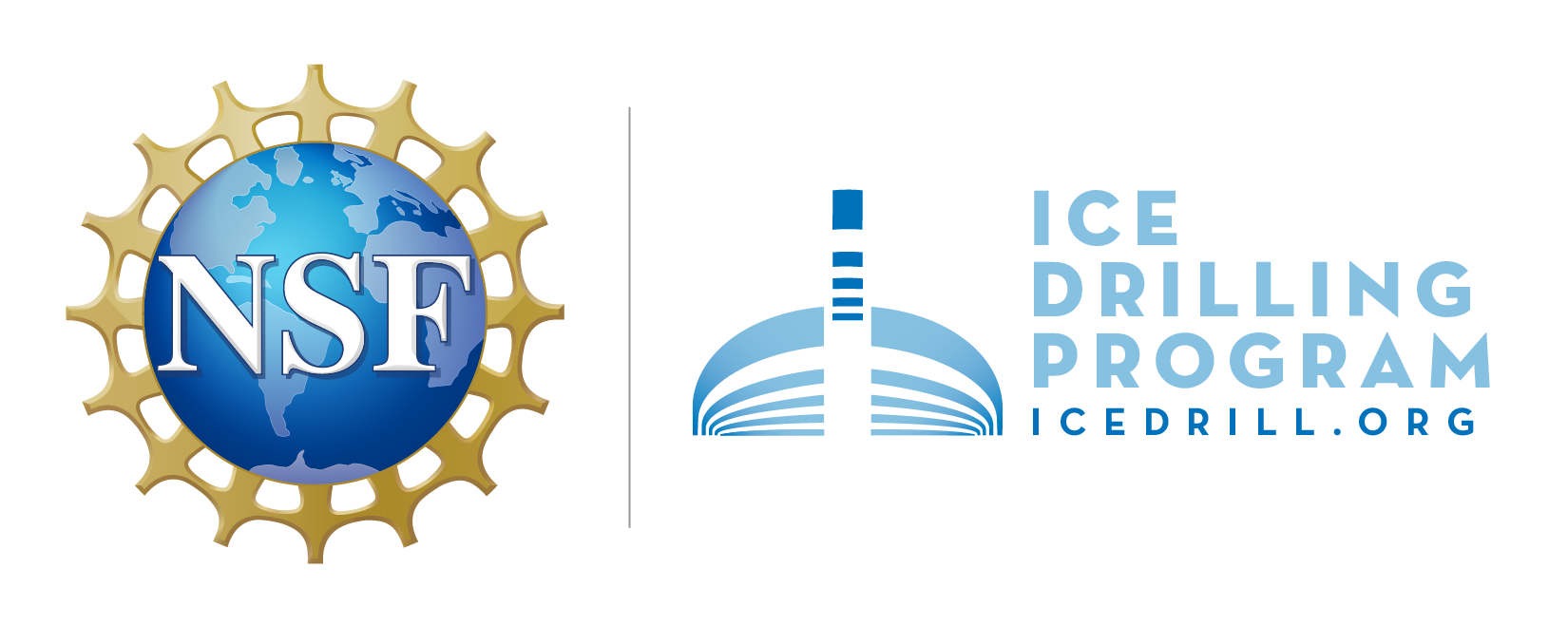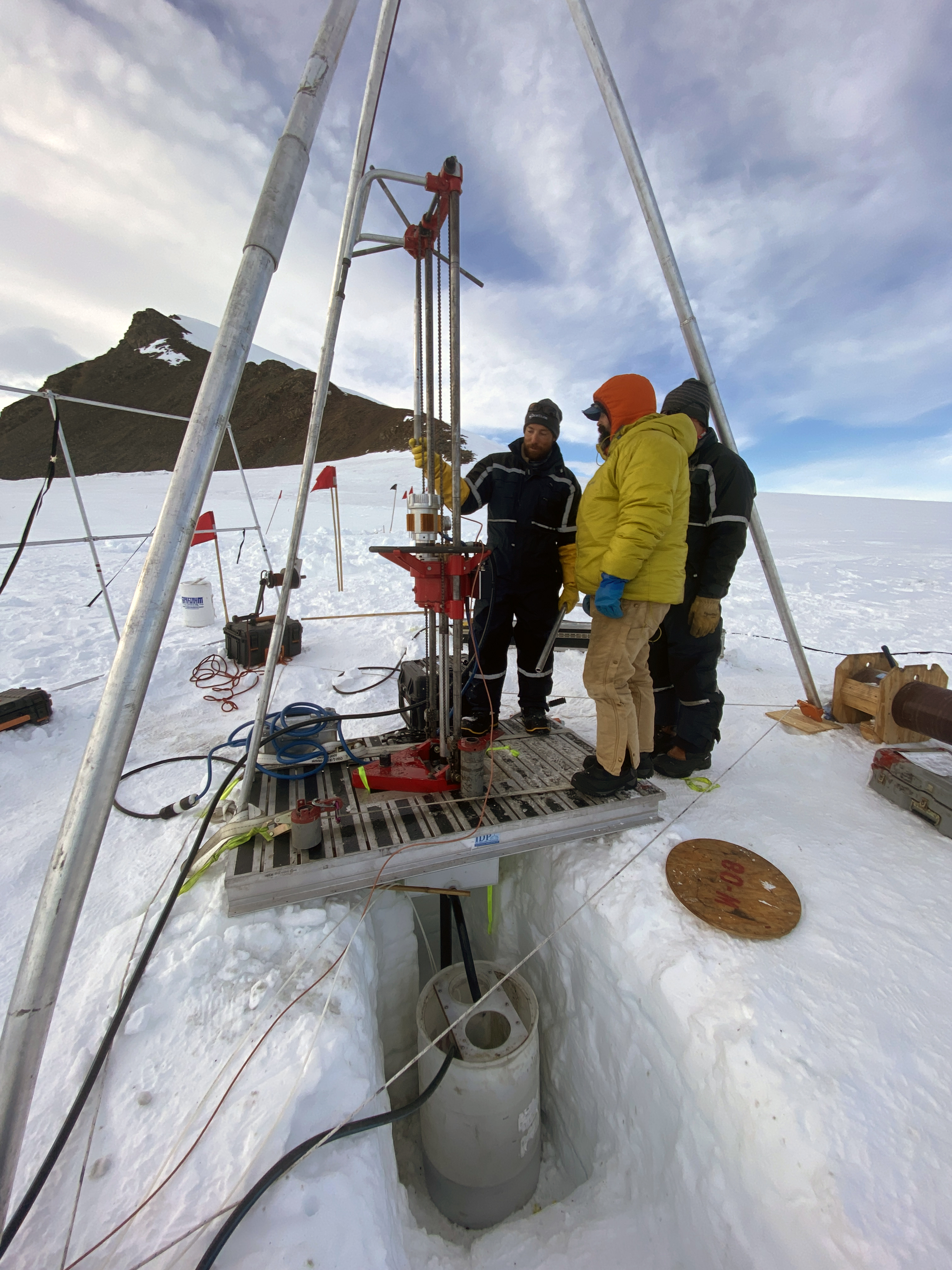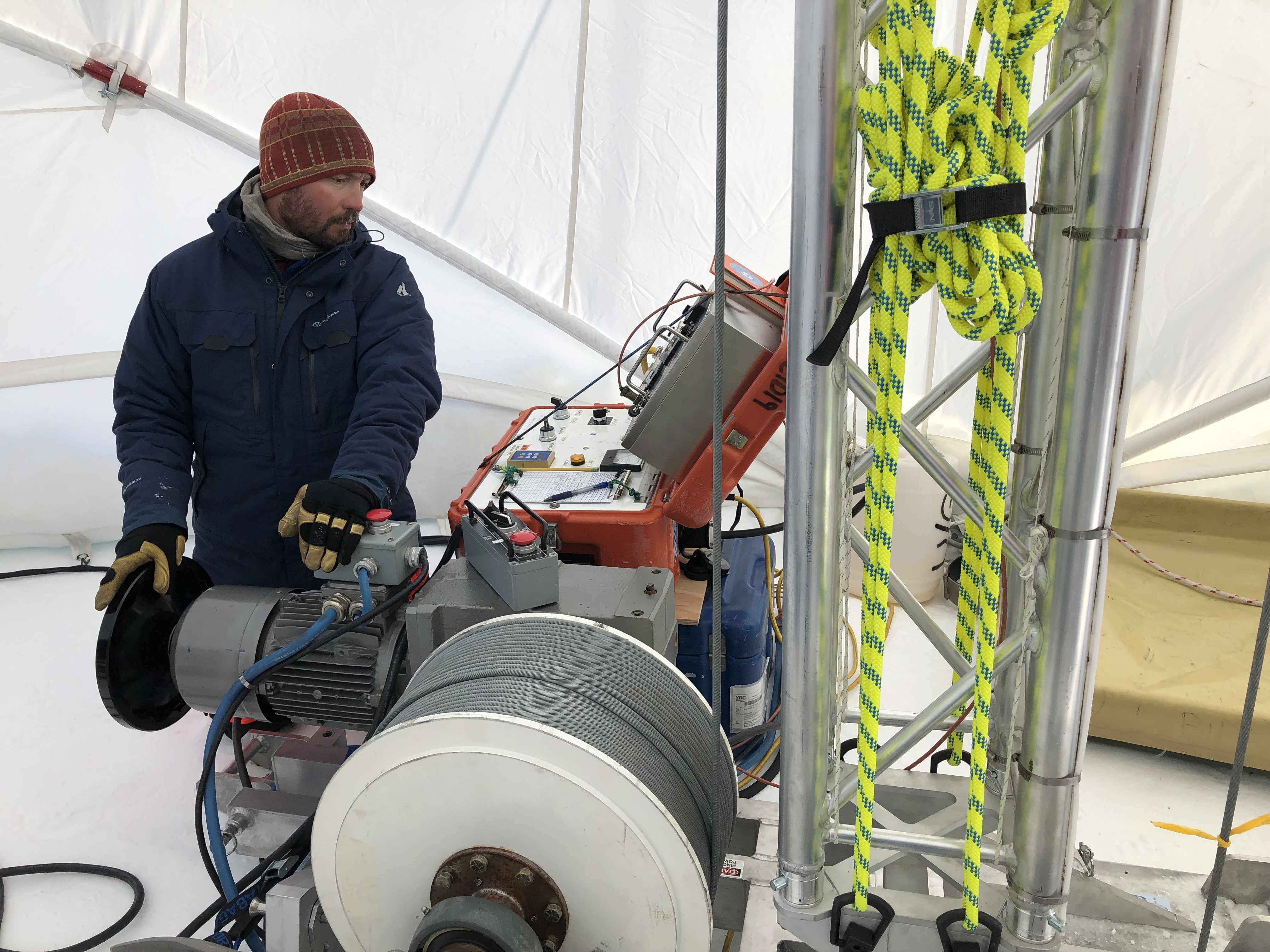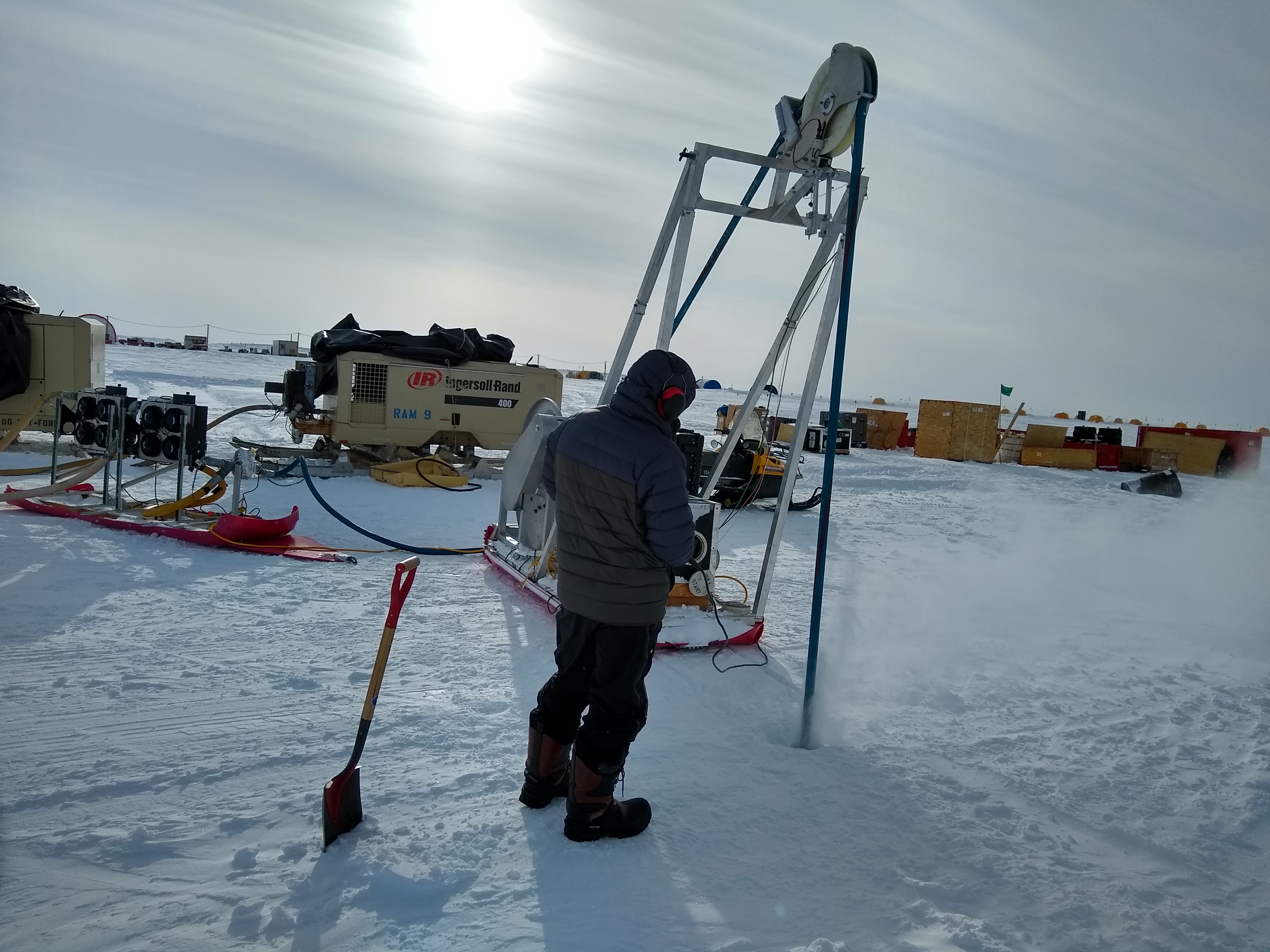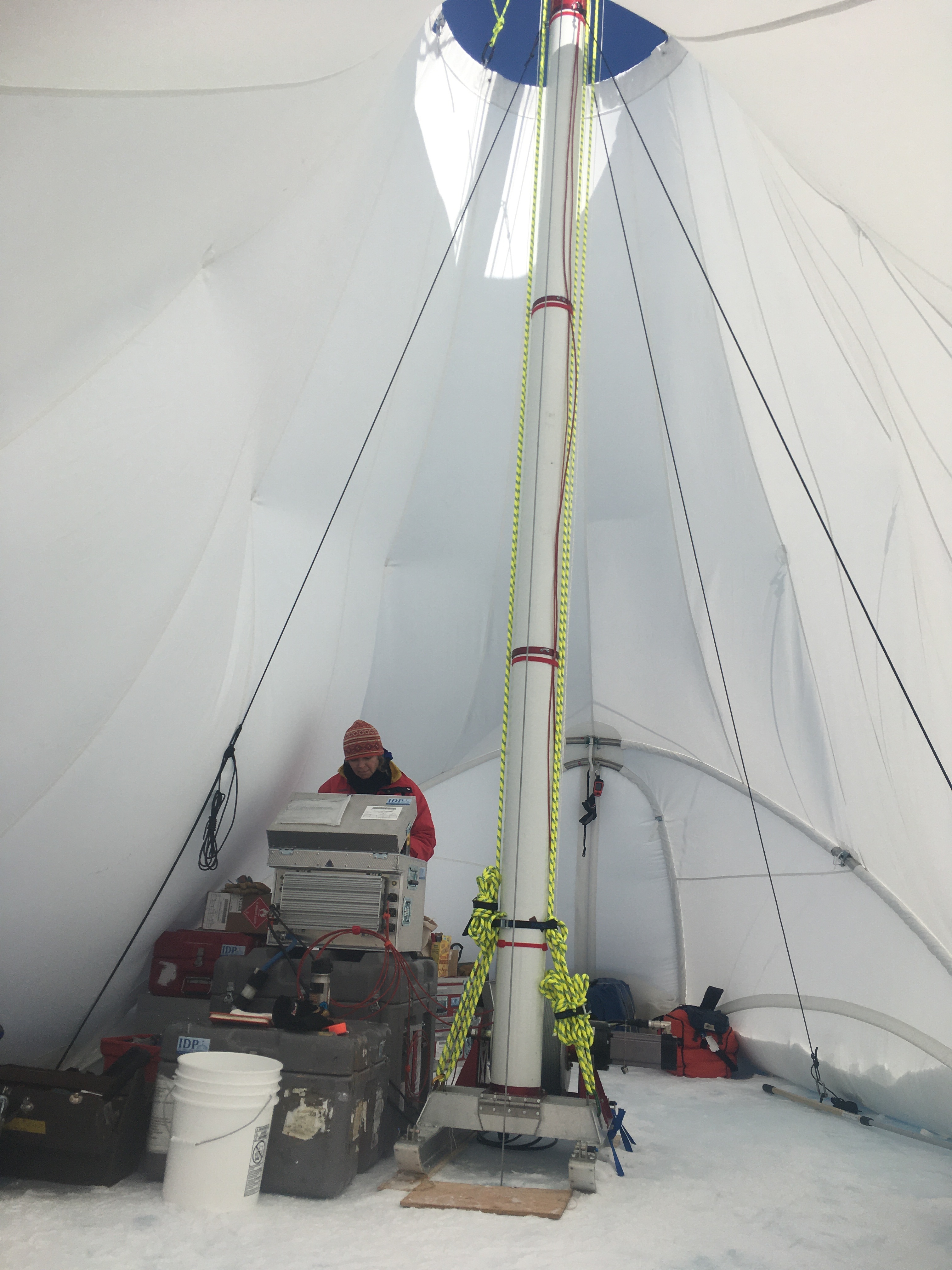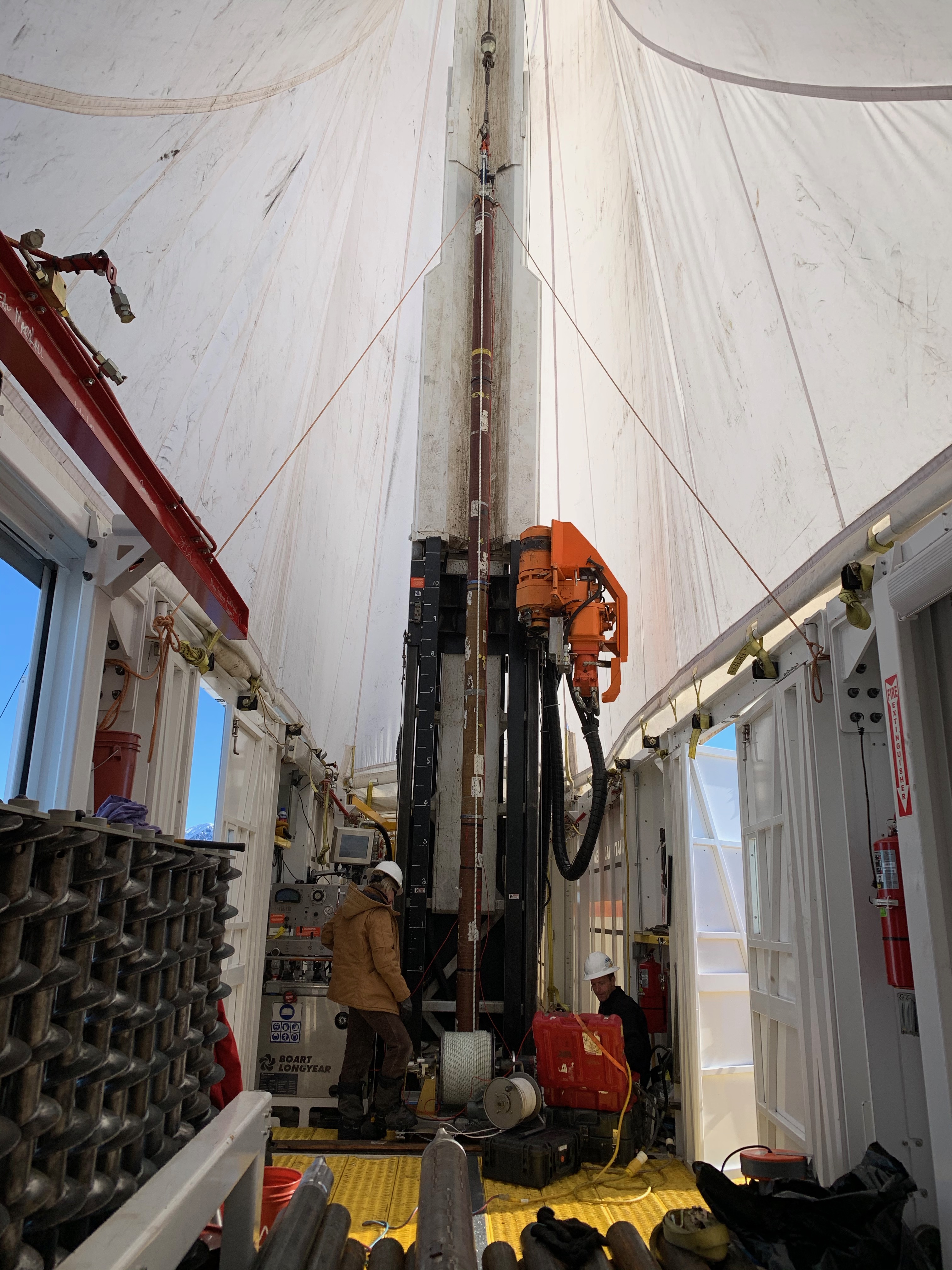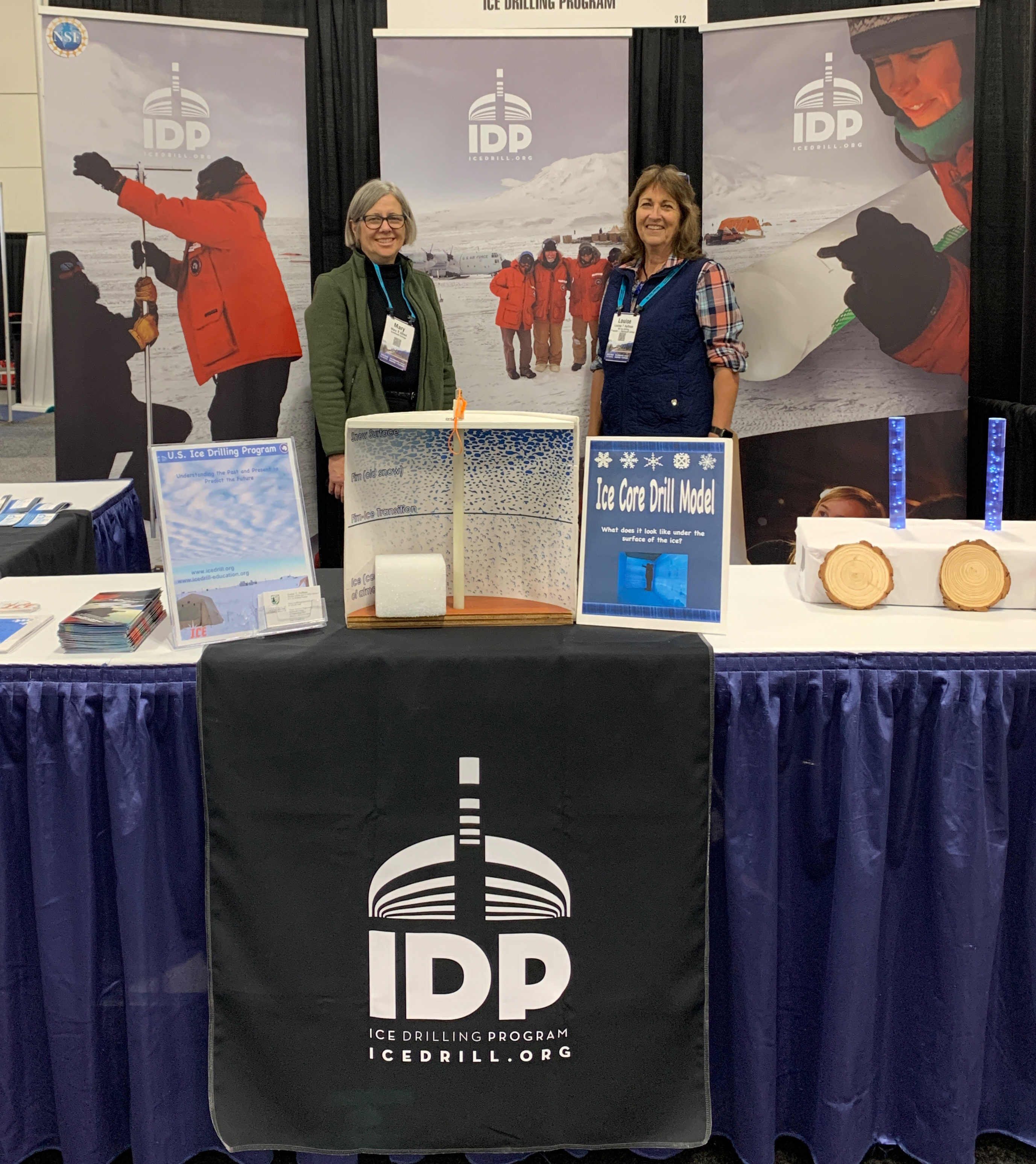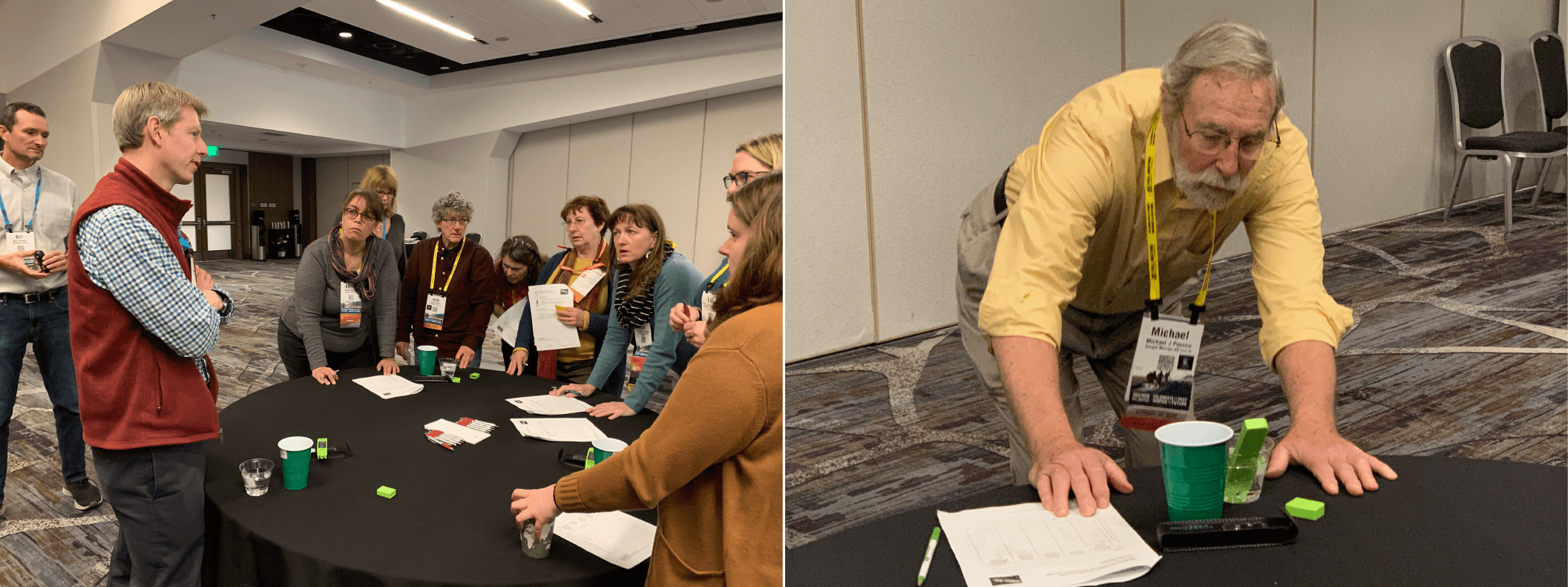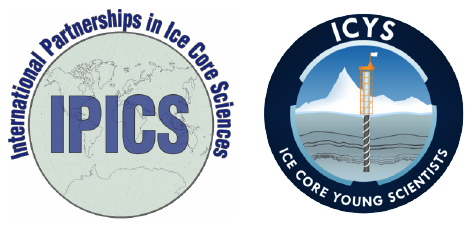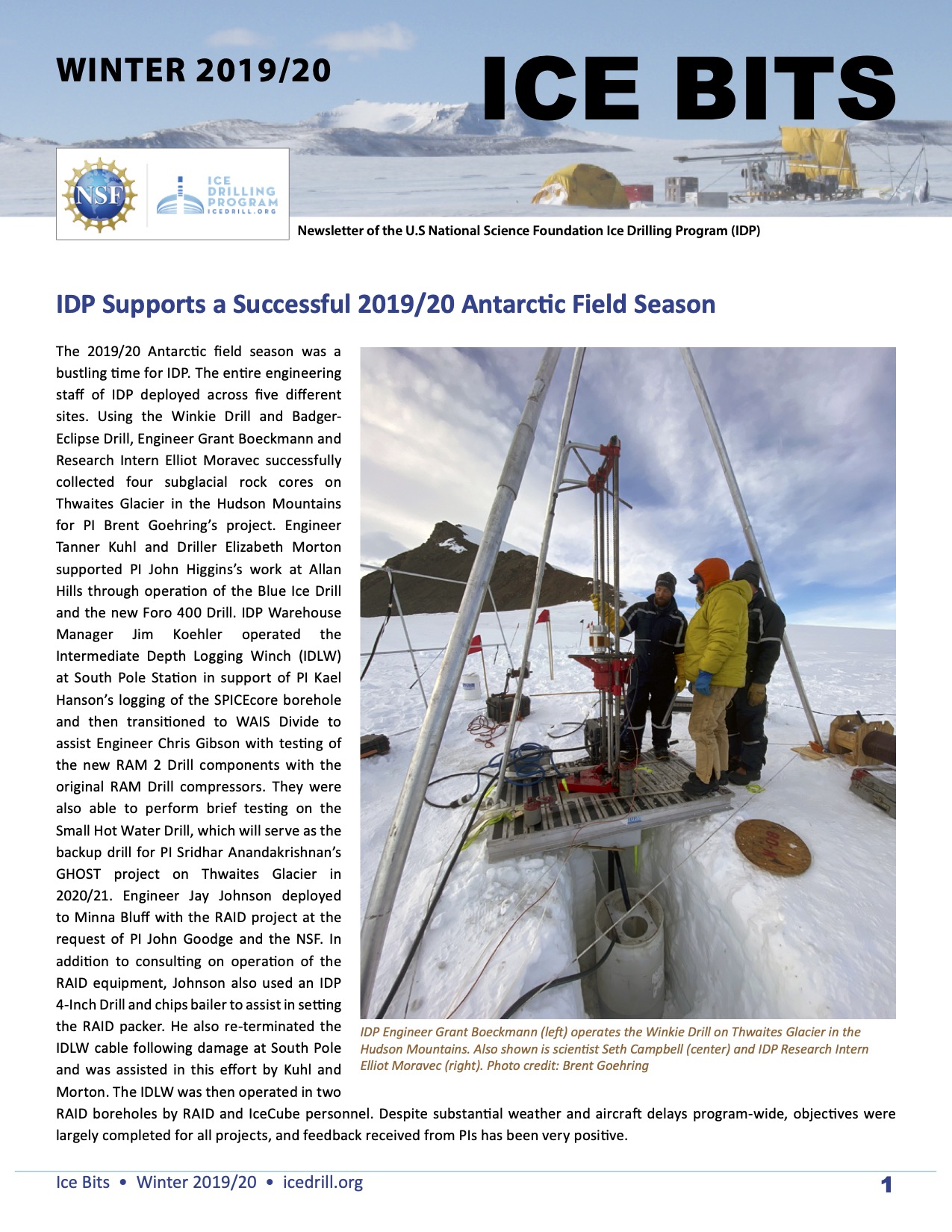IDP Supports a Successful 2019/20 Antarctic Field Season
- Fieldwork
- Winkie Drill
- Eclipse Drill
- Blue Ice Drill (BID)
- Foro 400 Drill
- Intermediate Depth Logging Winch
- Rapid Air Movement (RAM) Drill
- Small Hot Water Drill
- 4-Inch Drill
- Rapid Access Ice Drill (RAID)
The 2019/20 Antarctic field season was a bustling time for IDP. The entire engineering staff of IDP deployed across five different sites. Using the Winkie Drill and Badger-Eclipse Drill, Engineer Grant Boeckmann and Research Intern Elliot Moravec successfully collected four subglacial rock cores on Thwaites Glacier in the Hudson Mountains for PI Brent Goehring’s project. Engineer Tanner Kuhl and Driller Elizabeth Morton supported PI John Higgins’s work at Allan Hills through operation of the Blue Ice Drill and the new Foro 400 Drill. IDP Warehouse Manager Jim Koehler operated the Intermediate Depth Logging Winch (IDLW) at South Pole Station in support of PI Kael Hanson’s logging of the SPICEcore borehole and then transitioned to WAIS Divide to assist Engineer Chris Gibson with testing of the new RAM 2 Drill components with the original RAM Drill compressors. They were also able to perform brief testing on the Small Hot Water Drill, which will serve as the backup drill for PI Sridhar Anandakrishnan’s GHOST project on Thwaites Glacier in 2020/21. Engineer Jay Johnson deployed to Minna Bluff with the RAID project at the request of PI John Goodge and the NSF. In addition to consulting on operation of the RAID equipment, Johnson also used an IDP 4-Inch Drill and chips bailer to assist in setting the RAID packer. He also re-terminated the IDLW cable following damage at South Pole and was assisted in this effort by Kuhl and Morton. The IDLW was then operated in two RAID boreholes by RAID and IceCube personnel. Despite substantial weather and aircraft delays program-wide, objectives were largely completed for all projects, and feedback received from PIs has been very positive.
IDP Active Engagement at AGU Fall Meeting
- Education/ Outreach
- Meetings/ Workshops
For the first time, IDP sponsored a booth at AGU to reach more people than was possible at past Town Hall meetings. The booth allowed us to spend time talking with people interested in ice science and several surprise audiences were well represented besides scientists: educators wanting ideas for teaching about ice core research and climate change; undergraduate and graduate students interested in learning about research possibilities and careers; and early career scientists exploring options. It was a dynamic, exhilarating (and exhausting!) week.
In addition, Louise Huffman, Erich Osterberg, and educator Bill Grosser presented a workshop at the GIFT (Geophysical Information for Teachers) conference at AGU. Two new hands-on ice science labs were facilitated, and Erich followed the activities with an interactive talk. Feedback has been very positive. Louise also chaired two oral and two poster sessions and delivered an invited talk and an education and outreach poster.
Early Career Travel Opportunity for the IPICS & ICYS Meeting
- Meetings/ Workshops
- Funding Opportunities/ Solicitations
The U.S. Ice Drilling Program (IDP) offers an NSF-sponsored opportunity for U.S. early career scientists, postdocs, and PhD students in the U.S. to apply for travel support to the October 2020 ICYS and IPICS open science meetings in Crans-Montana, Switzerland. Successful applicants will be provided air and train tickets and will be registered for the conference by IDP. In addition, successful applicants will receive reimbursement of receipts for their cost of lodging and meals up to a potential maximum of $1,320 US; the exact amount will depend on the number of qualified applicants. Applicants must plan to attend the October 18 ICYS meeting as well. Applicants will be informed of the results of their application from IDP by April 6, 2020.
Applications will be accepted until 31 March 2020. To apply, create one pdf document that contains the following information:
- A one-page brief CV that includes your full name, current position, affiliation, mailing address, telephone number, education, and publication list
- Your draft one-page abstract for the IPICS meeting
Please email your application to IceDrill@Dartmouth.edu before 31 March 2020, under the subject heading “Application for Early Career Travel”.
IDP Ice Core Science Community Planning Workshop
- Meetings/ Workshops
- Long Range Plans
What: U.S. Ice Drilling Program Ice Core Science Community Planning Workshop
When: April 2-3, 2020
Where: Alexandria, Virginia, USA
Website: https://icedrill.org/meetings/ice-core-science-community-planning-workshop-2020
Registration Deadline: March 13, 2020
Sponsor: Mary Albert, Dartmouth, IDP Executive Director
IDP Ice Core Working Group Conveners: Erich Osterberg, Dartmouth; T.J. Fudge, University of Washington
The U.S. Ice Drilling Program Ice Core Working Group (IDP-ICWG) will hold a U.S. community planning workshop on April 2-3, 2020, at the Residence Inn Alexandria Old Town South at Carlyle in Alexandria, Virginia. The meeting will be all day on Thursday, April 2, and Friday morning, April 3.
Purpose: The purpose of this workshop is to articulate driving scientific questions in ice core research for the coming decade and beyond and identify drilling sites and technological and logistical requirements needed to answer those questions, for contribution to the U.S. Ice Drilling Program (IDP) Long Range Science Plan.
Description: Scientific discoveries achieved in the Arctic and Antarctic ice sheets and temperate glaciers are critical to society today, but they are not achieved without significant advance planning. The U.S. Ice Drilling Program (IDP) is sponsoring an interdisciplinary ice community workshop to identify science driving future Arctic and Antarctic ice coring sites, the ice drilling technology that will be needed, and the timeline over the coming decade for advancing ice core science on multiple frontiers. The outcome of the workshop will be white papers describing community endeavors with associated timelines that will become part of the updated U.S. Ice Drilling Program Long Range Science Plan.
Video-conferencing will be available for remote participation.
There is no registration fee for the workshop, but everyone planning to attend (even those attending remotely) MUST register so that we will have an accurate headcount for meeting room space and catering. The registration deadline is March 13. After we receive your registration, we will send you additional details of the meeting as it develops. If you plan to attend via video-conferencing, please indicate that on your registration so that we can be in contact.
Further details regarding the upcoming workshop in Alexandria, VA, including registration instructions, agenda, and future updates, can be found at https://icedrill.org/meetings/ice-core-science-community-planning-workshop-2020.
Call for Input – Long Range Science Plan 2020-2029
- Long Range Plans
IDP will be working with the Science Advisory Board and community members in the coming month to update the Long Range Science Plan. If you envision the need for ice drilling for your project in the coming decade, send several sentences describing the science driver and the envisioned field date and location for your project, so that your plans are voiced in this planning document. Please email your input to IceDrill@Dartmouth.edu soon! The 2019-2029 Long Range Science Plan is available at https://icedrill.org/long-range-science-plan.
Acknowledgment of IDP in Publications
- Publications
If you receive any support from IDP, we kindly request that you acknowledge IDP in any resultant publications or articles with the following statement: “We thank the U.S. Ice Drilling Program for support activities through NSF Cooperative Agreement 1836328.” If you have any questions, please contact us at IceDrill@Dartmouth.edu.
Ice Drilling Support for NSF Polar Proposals
- Funding Opportunities/ Solicitations
- Education/ Outreach
If you are preparing a National Science Foundation (NSF) proposal that includes any kind of support from IDP, you must include a Letter of Support from IDP in the proposal.
Researchers are asked to provide IDP with a detailed support request three weeks prior to the date the Letter of Support is required. Early submissions are strongly encouraged.
Scientists who seek to include IDP education and outreach activities associated with U.S. ice coring or drilling science projects should contact Louise Huffman at Louise.T.Huffman@Dartmouth.edu during their proposal preparation stage.
For further information on requesting IDP support, visit our website at https://icedrill.org/requesting-field-support or contact us at IceDrill@Dartmouth.edu.
